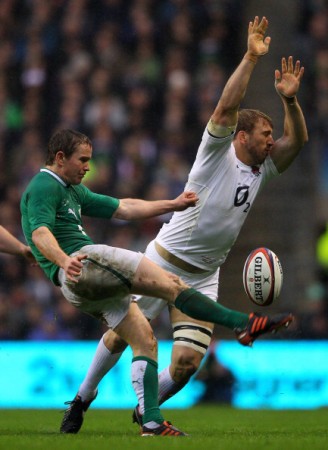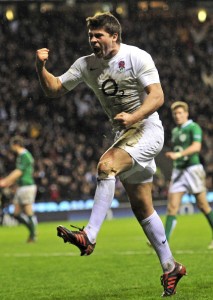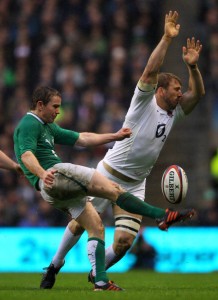
Front up: England's Dan Cole, Dylan Hartley and Alex Corbisiero celebrate being given a penalty try against Ireland
By Ben Coles
Four wins from five. Not even the most optimistic England fan in their right mind would have predicted that outcome at the start of this year’s RBS 6 Nations. Yet now England will look back on their defeat to Wales not with the same sense of pride they seemed to feel at the time, but with a sour taste of what might have been.
That sense of regret is only warranted based on their two outstanding performances in the last two weeks. After the attacking joie de vivre of Paris came the brute power of England’s scrum against the Irish. The scrum is often chastised for it’s consumption of valuable time on the clock, but Saturday proved that if you can create a powerful platform, you do not just secure possession but also force your opposition to submit.
Alex Corbisiero showed flashes of brilliance against Wales and France, but against Ireland he was magnificent. His personal demolition of first Mike Ross and then Tom Court brought great satisfaction to the Twickenham faithful, though it would be rude to forget the exploits of his cohorts Dylan Hartley and Dan Cole.
Of course, there is little point in creating countless penalty opportunities if you have no one available to convert them. In Owen Farrell, England have less a kicker and more a marksman of the highest calibre. His 20 points against Wales are just the start of what should be a lengthy England career. Whilst his style is certainly more direct and routine than say that of Rhys Priestland of Johnny Sexton, there is flair within him that we are yet to see at Test level.
The pack may have brought about England’s first try of the afternoon, but the second one was one of individual rapture. It’s difficult to decide who needed Ben Youngs to score a try more; himself or the England fans who were beginning to lose faith in him. Yet his snipe from a tap penalty after yet another massacre at the scrum was vintage Youngs, if the term can be applied to a player quite so young. The outpouring of emotion that came as a result was a visual example of the monkey being thrown from his back.
To have won four matches with a new captain and such a large quantity of new players in the starting XV (Botha, Parling, Robshaw, Morgan, Dickson, Farrell and Barritt all started against Ireland despite not having been involved at the Rugby World Cup) says a great deal about the attitude and camaraderie in the camp. Certainly Stuart Lancaster deserves praise for this, but perhaps the good work of Chris Robshaw has been forgotten. In that most savage of international arenas the weekend before last in Paris, Robshaw put in 24 tackles. He has been a warrior, who off the field has gone about his business quietly but on it has lead his side superbly.
Four wins from five. That, surely, must be enough to give Lancaster the job long term. It is a position that he wants, not just for personal ambitions but because he better than anyone sees the potential of this side. Why after establishing that level of trust, passion and unity between players and coaches would the RFU want to start again with Nick Mallett? In a way, he has made the decision futile. Why? Because whomever the RFU appoint, Lancaster is the right coach to take England forward. Bring in someone such as Sir Clive Woodward to help handle the managing side of affairs, certainly, but do not take a backward step after making such giant strides forward. English rugby is on the rise again. It feels good.








